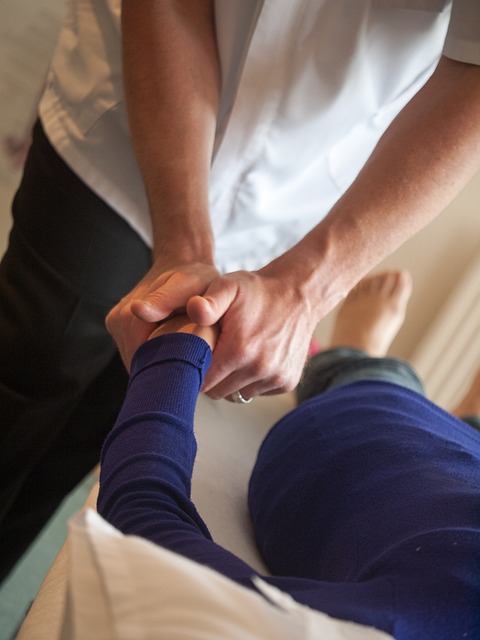Cold plunges and water immersion offer a natural way to support endocrine health by regulating hormones. This therapy reduces cortisol levels, stimulates the release of endorphins and norepinephrine, and promotes better sleep patterns. Regular exposure enhances human growth hormone production, boosting metabolism, muscle retention, bone density, and immune function. Incorporating cold plunges into your routine after workouts or mornings can effectively manage stress, reduce stress hormones, and optimize hormonal balance while ensuring safety measures are in place.
Discover the powerful impact of cold plunges on your endocrine health. This ancient practice is making waves in modern wellness circles as a game-changer for maintaining hormonal balance. In this comprehensive guide, we explore the science behind cold water therapy and its ability to reduce stress hormones while regulating key endocrine functions. Learn practical tips for safe implementation and unlock the secrets to enhancing your overall well-being through this effective natural remedy.
Understanding Endocrine Health and Its Connection to Cold Plunges
Endocrine health refers to the balanced functioning of your hormones, which play a pivotal role in regulating various bodily processes, including metabolism, growth, and development. Hormones act as chemical messengers, ensuring optimal communication between different organ systems. Disruptions in endocrine health can lead to a myriad of issues, from weight fluctuations and fatigue to mood disorders and reproductive problems.
Cold plunges, or cold water immersion, have emerged as a holistic approach to supporting endocrine health. This therapy involves briefly exposing oneself to cold water, often through quick dives or immersions in ice baths. By doing so, the body is prompted to release hormones like norepinephrine and cortisol, which are crucial for stress response and energy regulation. Cold exposure also stimulates the production of endorphins, natural painkillers that contribute to a sense of well-being. Additionally, cold water therapy has been linked to reduced levels of stress hormones, such as cortisol, which can negatively impact hormonal balance when elevated over prolonged periods.
The Science Behind Cold Water Therapy and Hormone Regulation
The science behind cold water therapy suggests that subjecting your body to cold plunges can have profound effects on hormonal balance. When you immerse yourself in cold water, whether through a cold plunge or ice bath, your body experiences a stress response, triggering the release of hormones like cortisol and adrenaline. However, this initial stress is followed by a subsequent decrease in these stress hormones, which can lead to improved hormone regulation over time. This process helps reset your body’s internal clock, promoting better sleep patterns and enhancing overall endocrine health.
Cold exposure for hormone regulation has been shown to boost the production of human growth hormone (HGH), often referred to as the “fountain of youth” hormone. HGH plays a crucial role in maintaining metabolic balance, muscle mass, bone density, and immune function. By consistently engaging in cold water immersion, you can potentially increase your body’s natural production of HGH, contributing to optimal endocrine function and overall well-being. This simple yet powerful technique has gained popularity among athletes and individuals seeking to optimize their hormonal balance and enhance recovery processes.
Benefits of Cold Plunges for Stress Hormone Reduction and Balancing Actives Hormones
Cold plunges, or immersing oneself in cold water, have gained popularity as a powerful tool for promoting overall health, and one of its notable benefits is its positive impact on stress hormone reduction. When you expose your body to cold water, it triggers a cascade of physiological responses that help lower cortisol levels, often referred to as the ‘stress hormone’. Cortisol plays a significant role in our ‘fight or flight’ response, but chronically elevated levels can lead to various health issues. Cold therapy helps reset this balance by stimulating the release of other hormones, such as norepinephrine and endorphins, which promote feelings of calm and well-being.
Moreover, regular cold plunges are a natural way to support hormone regulation and maintain a healthy endocrine system. The cold temperature signals the body to increase thyroid function, boost metabolism, and optimize insulin sensitivity. This balancing act can lead to improved energy levels, better mood regulation, and even enhanced sexual function. By incorporating cold water immersion into your wellness routine, you can take a proactive step towards managing stress and promoting optimal hormonal balance.
Implementation Tips and Safety Considerations for Effective Cold Therapy
When implementing cold plunges as part of your routine for endocrine health, there are several practical tips and safety considerations to keep in mind. Start by gradually exposing yourself to cold water, beginning with cooler temperatures and slowly decreasing the temperature over time. This allows your body to adapt and reduces the risk of shock or discomfort. Incorporate cold plunges into your post-workout routine or as a morning ritual—anytime your hormones could use a boost is ideal. Always ensure you’re in a safe environment before attempting a cold plunge, especially if doing so outdoors.
Safety should be a top priority when engaging in cold water therapy for hormones. Wear appropriate protective gear, such as a wetsuit or cold-water suit, to maintain body warmth and prevent hypothermia. Keep an eye on the time spent in the cold; while brief exposure can offer benefits, prolonged immersion may be counterproductive. Drink plenty of warm fluids before, during, and after your plunge to help regulate your body temperature. If you experience any adverse effects like severe dizziness or chest pain, immediately exit the cold water and seek medical attention.
Cold plunging offers a simple yet powerful tool to support and optimize endocrine health. By integrating this practice into your routine, you can experience the beneficial effects of cold water therapy, promoting hormone regulation and reducing stress hormones. With proper implementation and safety considerations, cold therapy can be a game-changer in achieving hormonal balance and overall well-being. Embrace the benefits of cold plunges to transform your endocrine health journey.
